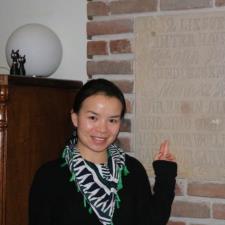How to form a simple question in Chinese?
3 Answers By Expert Tutors
To form a simple question in Chinese, you can often add a question word or phrase at the end of a statement. One of the most common methods is using "吗" (ma), which turns a statement into a yes-no question without altering the word order of the statement. Here are the steps and an example:
(1) Start with a statement: "你好" (Nǐ hǎo) - "You are good" or simply "Hello."
(2) Add "吗" (ma) at the end: "你好吗?" (Nǐ hǎo ma?) - "Are you good?" or "How are you?"
For questions seeking specific information, you can use question words like "什么" (shénme) for "what", "谁" (shéi) for "who", "哪里" (nǎlǐ) for "where", "为什么" (wèishéme) for "why", and "怎么" (zěnme) for "how". Place these question words where the answer is expected in the sentence structure:
(1) "你在做什么?" (Nǐ zài zuò shénme?) - "What are you doing?"
(2) "你的书在哪里?" (Nǐ de shū zài nǎlǐ?) - "Where is your book?"
This approach allows you to form simple questions in Chinese by either turning a statement into a yes-no question with "吗" or incorporating specific question words to seek particular information.
Todd C. answered • 09/22/22
Certified Mandarin Instructor & Bi-Cultural Communications Coach
There are two easy ways to ask a question.
The first and simplest method is as mentioned by Siqi. Simply add the question particle—ma' 吗—to the end of a statement.
Examples:
1) It's raining. xià yǔ le. 下雨了。Simply add the question particle—ma' 吗—at the end of the statement. Is it raining? xià yǔ le ma? 下雨了吗?
2) He is a teacher. tā shì lǎo shī. 他是老师。———— Is he a teacher? tā shì lǎo shī ma? 他是老师吗?
3) They know how to speak Chinese. tā men huì shuō zhōng wén. 他们会说中文。———— Do they know how to speak Chinese? tā men huì shuō zhōng wén ma? 他们会说中文吗?
Another common way to ask a question in Chinese is use the verb-not-verb phrase. Considering the above sentences, we drop—ma' 吗—and replace the verb with a verb-not-verb phrase.
1) Sentence one, the verb is—xià yǔ 下雨. To make this verb a question, we create a verb-not-verb phrase. I.e. rain-not-rain / Is it raining? xià yǔ bú xià yǔ? 下雨 不 下雨?
2) Sentence two, the verb is shì 是. Create a verb-not-verb phrase. I.e. is-not-is, shì bú shì 是 不 是. Replace the verb with the verb-not-verb phrase and drop—ma' 吗.—— Is he a teacher? tā shì bú shì lǎo shī? 他是不是老师。
3) Sentence three, the verb is huì 会—to know how to. Create a verb-not-verb phrase. I.e. know how to-not-know how to, huì bú huì 会不会. Replace the single verb with the verb-not-verb phrase and drop—ma' 吗. —— Do they know how to speak Chinese? tā men huì bú huì shuō zhōng wén? 他们会不会说中文?
I hope this is helpful. Check out my profile for more information about me and how I can help you learning Mandarin Chinese.
再见!😊
Siqi R. answered • 05/17/22
Learning a new language opens a door to the new world
You
You can simply do that by adding character " 吗” and a question mark behind. for example: "你吃饭了吗?" which means "Did you eat?" the pinyin for “吗“ is ” ma “, no tone on it.
Still looking for help? Get the right answer, fast.
Get a free answer to a quick problem.
Most questions answered within 4 hours.
OR
Choose an expert and meet online. No packages or subscriptions, pay only for the time you need.







Siqi R.
You can simply do that by adding character " 吗” and a question mark behind. for example: "你吃饭了吗?" which means "Did you eat?" the pinyin for “吗“ is ” ma “, no tone on it.05/17/22